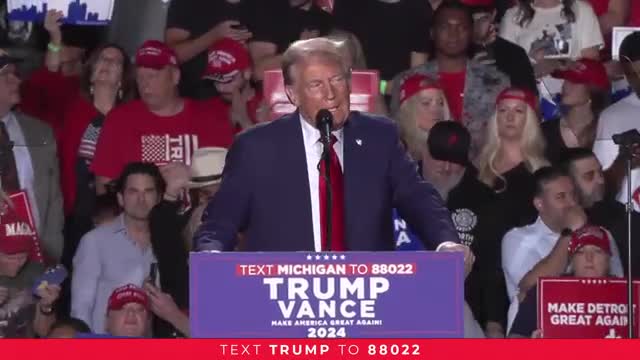Trump vows to revive Detroit's auto industry with bold tariffs
October 19, 2024 | Donald J. Trump, Presidential Candidates 2024
This article was created by AI summarizing key points discussed. AI makes mistakes, so for full details and context, please refer to the video of the full meeting. Please report any errors so we can fix them. Report an error »

In a recent government meeting, discussions centered around the future of the auto industry in Detroit and the implications of foreign manufacturing on local economies. The speaker emphasized a commitment to prioritizing Detroit, Michigan, and the broader American workforce, asserting that significant changes are on the horizon for the auto sector.
The speaker highlighted the construction of a large auto plant in Mexico, backed by Chinese investment, and expressed concerns that this development could undermine the automotive industry in Michigan. However, they claimed to have already taken steps to counter this threat, suggesting that tariffs would be imposed on vehicles produced in Mexico for sale in the U.S. market. This move, they argued, would protect jobs in Detroit and encourage manufacturers to relocate their operations back to the United States.
During the meeting, the speaker recounted a conversation with a prominent auto plant builder who indicated that plans for the Mexican facility had been halted, citing uncertainty about future tariffs. This development was framed as a victory for Detroit, with the speaker promising to advocate for the establishment of new manufacturing plants within the U.S., ideally in Detroit itself.
The overarching message was one of optimism for the revival of the American auto industry, with the speaker urging voters to support policies that would facilitate a shift of manufacturing jobs from Mexico back to Michigan. They asserted that a robust auto industry would not only benefit Detroit but also stimulate economic growth across the region, enhancing the livelihoods of suppliers and boosting real estate values.
The meeting concluded with a call to action for voters to support these initiatives, framing the potential resurgence of Detroit's manufacturing sector as a critical component of the broader economic recovery narrative.
The speaker highlighted the construction of a large auto plant in Mexico, backed by Chinese investment, and expressed concerns that this development could undermine the automotive industry in Michigan. However, they claimed to have already taken steps to counter this threat, suggesting that tariffs would be imposed on vehicles produced in Mexico for sale in the U.S. market. This move, they argued, would protect jobs in Detroit and encourage manufacturers to relocate their operations back to the United States.
During the meeting, the speaker recounted a conversation with a prominent auto plant builder who indicated that plans for the Mexican facility had been halted, citing uncertainty about future tariffs. This development was framed as a victory for Detroit, with the speaker promising to advocate for the establishment of new manufacturing plants within the U.S., ideally in Detroit itself.
The overarching message was one of optimism for the revival of the American auto industry, with the speaker urging voters to support policies that would facilitate a shift of manufacturing jobs from Mexico back to Michigan. They asserted that a robust auto industry would not only benefit Detroit but also stimulate economic growth across the region, enhancing the livelihoods of suppliers and boosting real estate values.
The meeting concluded with a call to action for voters to support these initiatives, framing the potential resurgence of Detroit's manufacturing sector as a critical component of the broader economic recovery narrative.
View full meeting
This article is based on a recent meeting—watch the full video and explore the complete transcript for deeper insights into the discussion.
View full meeting